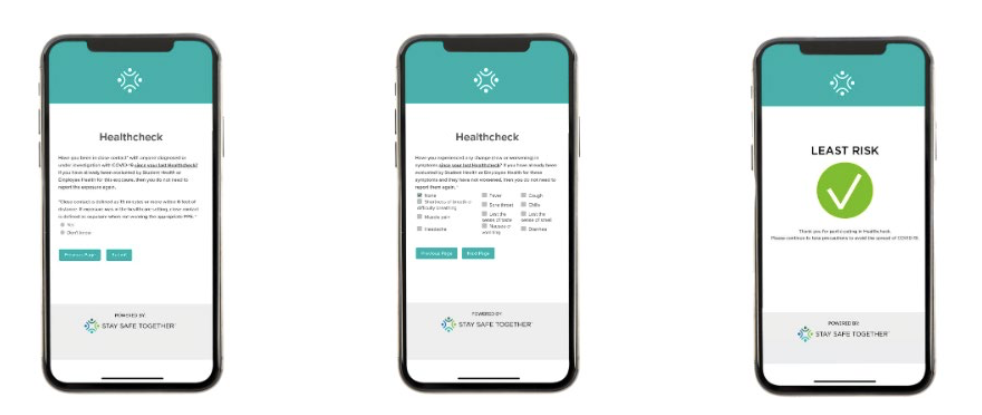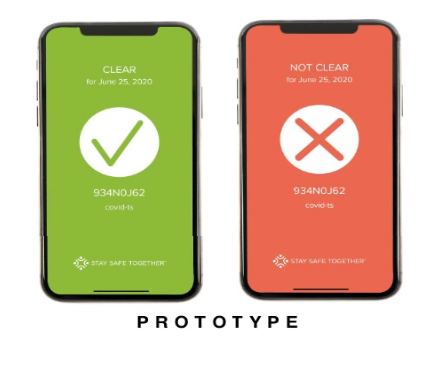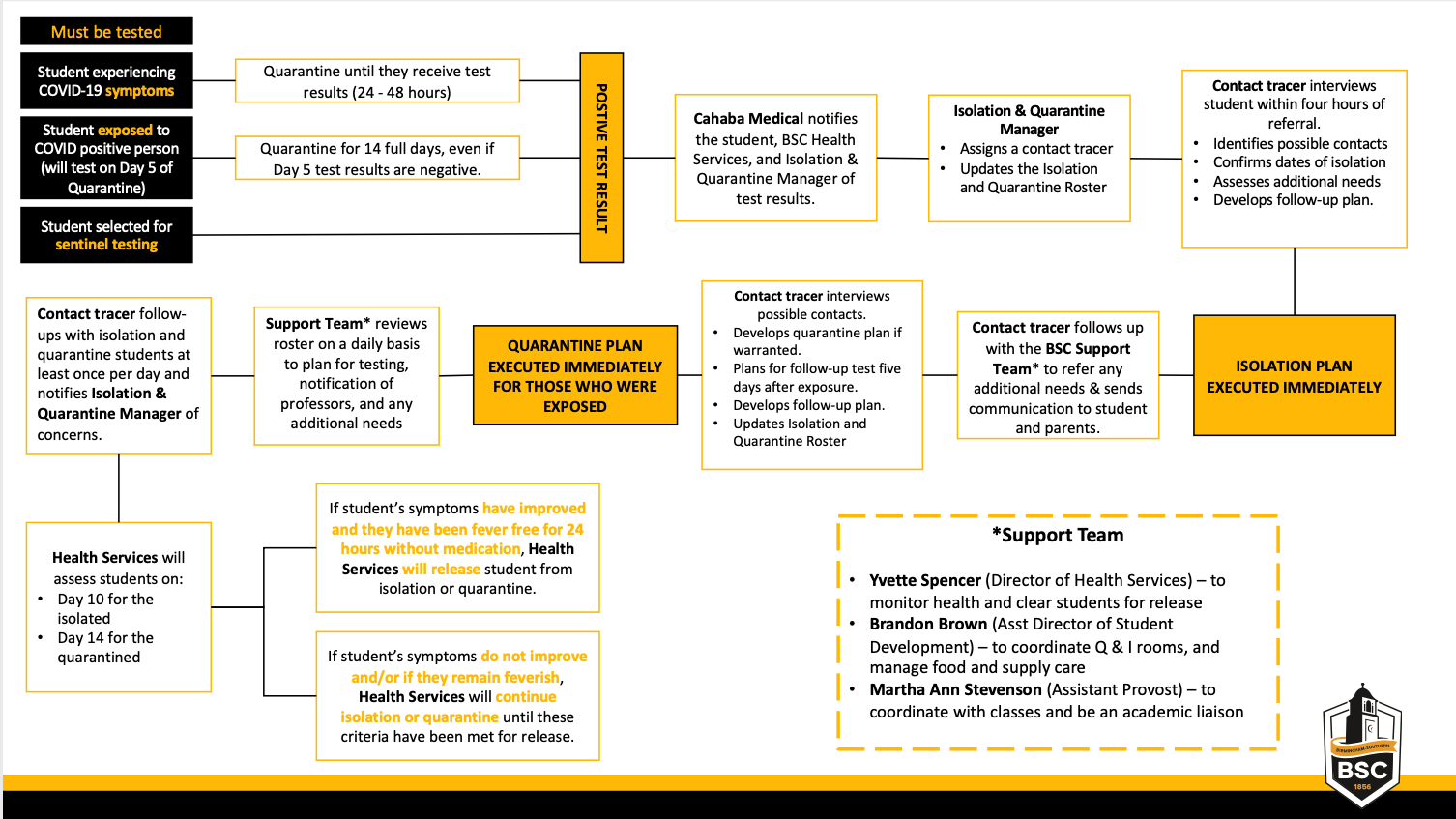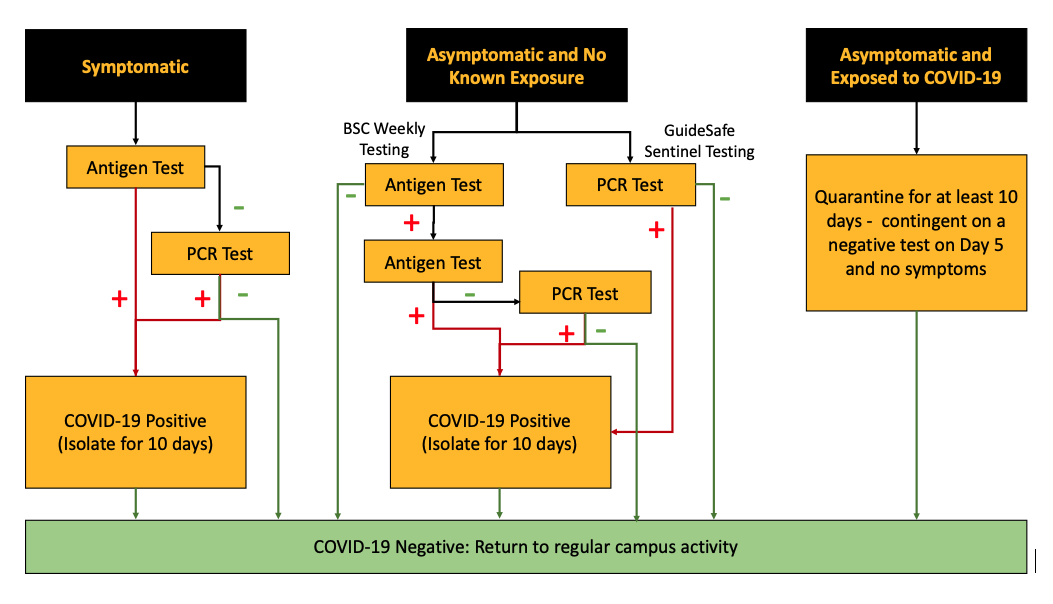Entry Testing for E-Term and Spring Term
January may well be the worst month of this pandemic. Many students and employees will have traveled during the holidays. Vaccinations will just be starting. Our testing protocol for re-entry is an important line of defense to establish the campus as close to COVID-free as possible from day one.
Similar to fall entry, all BSC students and employees will be required to take two COVID-19 tests prior to their 2021 return to campus. No students or employees should come on campus if they have tested positive or have been exposed to someone who tested positive 10 days before their arrival date. Students and employees will take one PCR test about a week before arrival date and one antigen test the day of arrival.
For E-Term entry, students who live more than 30 minutes from campus should have picked up a CoughDx test before they left campus or have received an email telling them they will have a CoughDx test mailed to them this week (by December 15). Students who live locally should have received an email with instructions about our Monday, December 28, on-campus testing plan or picking up a CoughDX test if they will not be available. Similarly, BSC employees can participate in the on-campus testing plan or, if traveling, can pick up a CoughDX test and return it by mail. By December 29, all students and employees should have taken their first entry (PCR) test. If none of these options are possible, the responsibility falls on the student or employee to take a PCR test from a third-party testing site and send documentation of a negative test result to [email protected] before arriving on campus. No negative test result = no entry.
Day of Arrival Testing
On Monday, January 4, and Tuesday, January 5, 2021, we will host campus-wide testing for returning students and employees in the Striplin Center. Students and employees will be given a 15-minute antigen test. Once cleared with a negative test result, students will officially be checked in. There will be no need to quarantine beyond the 15-minute wait for results. An email will be sent to students and employees soon to sign up for an arrival and testing time on these dates.
For spring term entry for students and employees not on campus during January, we will require a similar protocol of pre-arrival and arrival testing. More information will follow in January for these students and employees.
E-Term / Spring Sentinel Testing Protocol
Given the continual rise of COVID-19 cases, students will be required to take weekly antigen tests. Students will sign up for a testing day and time during E-Term that fits their schedule, and will re-enroll for a testing day and time during spring term to take their weekly antigen tests. Regular testing time and day will allow students to better manage their testing requirement and schedule. Failure to follow the weekly testing protocol will lead to immediate consequences for students, including blocked access to online resources (i.e., email, Moodle, etc.), and possible removal from campus.
BSC employees are required to test during the first week of every month, although they have the option to test multiple times each month as they see fit to their risk tolerance. We believe the adoption of this more robust testing strategy will better mitigate the risk of COVID-19 transmission in our community and keep us all healthier.
Students and faculty/staff who have previously tested positive
We have been advised by our COVID Medical Team and by the Centers for Disease Control and Prevention (CDC) that students and employees who have tested positive for COVID-19 within the last 12 weeks are exempt from entry testing and weekly sentinel testing until that 12-week window expires. The latest studies show that people can continue to test positive for up to three months after diagnosis, and that these tests may not be accurate.
The bigger issue is whether people who have been infected with COVID-19 can become infected again. This is what we know: Re-infection rates are extremely rare. There are less than 20 reported cases of re-infection in the world, compared to the almost 68 million confirmed cases. In addition, many studies support the claim that antibodies last longer than 12 weeks. However, without a concrete recommendation from the CDC and as a precaution, students and employees past the 12 weeks are subjected to the testing protocol. Because this protocol is not necessarily aligned with the data our experts see, it is possible that this protocol may change over time, enabling those who have had the virus to be exempt from testing (not other protocols such as mask wearing and social distancing) for the rest of the year. For now, we have to follow the current rules.
Note to students: If you test positive during winter break, please email your positive test to [email protected]. If faculty or staff test positive during winter break, please email your positive test to [email protected]. Additionally, if you test positive or are exposed to someone who tests positive, please do not come to campus until you have appropriately quarantined or isolated. Otherwise, we will have records of all students and employees who have tested positive during the fall term. You will have to follow testing and quarantine and isolation protocols if you tested positive more than 12 weeks ago.
Antigen Tests
For our weekly tests for the student body and tri-weekly tests for athletes, Cahaba Medical Care will administer Abbott’s BinaxNOW Ag Card 15-minute antigen tests. BinaxNOW has a 97.1% sensitivity rate (100% sensitivity rate = no false negatives) and a 98.5% specificity rate (100% specificity rate = no false positives). There has been reporting that antigen tests are not as accurate in asymptomatic patients; however, we have been advised by our COVID-19 team that when antigen tests are administered regularly, that would combat some of the discrepancy.
Notwithstanding, PCR tests are the “gold standard” for clinical diagnostic detection and have a higher sensitivity and specificity rate than antigen tests. We will continue to use some PCR tests throughout the term and to compare the results to antigen results. We took the CDC’s recommendation on their antigen test algorithm to create one specifically for the Birmingham-Southern community:
Here are the scenarios explained verbally:
- If you are symptomatic, you will take an antigen test.
- If it is positive, you will follow isolation protocols.
- If it is negative, it must be confirmed with a PCR test.
- If you are asymptomatic and have no known exposures (this will be during weekly or sentinel testing):
- If you receive a positive antigen test, you will take another antigen test. If the second antigen test is positive, you will follow isolation protocols. If the second antigen test is negative, you will receive a PCR test to confirm results.
- If you receive a PCR test (from GuideSafe/healthy@verily’s sentinel testing) and it is positive, you will follow isolation protocols.
- If you are asymptomatic and have been exposed to COVID-19, you will be quarantined for at least 10 days. On day five or six, you will receive a PCR test.
GuideSafe will continue to partner with us to randomly select and administer their weekly sentinel tests. If someone is chosen to take a sentinel test, they do not have to take their regularly scheduled test for that week.
Healthcheck
We will continue checking our symptoms daily through the BSC Healthcheck for E-term and spring term. Staying vigilant to our symptoms and our surroundings helped us succeed in having low COVID-19 numbers in the fall. Healthcheck passports will continued to be checked in public spaces such as classrooms and the Striplin Center. Additionally, we will ask students, faculty, and staff to renew their Panther Pledge as a continual commitment to the BSC community.
To access GuideSafe Healthcheck, simply go to your “myBSC” tab and click on “BSC Healthcheck”. Your Healthcheck is integrated to your BSC username and password. We highly recommend students bookmark or save the link as this will be part of our daily routine during the term.
Healthcheck takes approximately one minute to complete. The user will be asked if they’ve been exposed to a COVID positive person and will be asked about any symptoms they may have at the time. Upon completion, they are assigned a risk category with actionable items.


After completing Healthcheck, we’ll have access to their GuideSafe event passport. The event passport will be used to keep us accountable to each other and facilitate access to meetings, events, or classrooms hosting 10 or more people. Like Healthcheck, the event passport resets every 24 hours and is username specific.
According to the CDC, these symptoms are:
- Cough
- Shortness of breath or difficulty breathing
- Fever (100.4 degrees or more)
- Chills
- Repeated shaking with chills
- Muscle pain
- Sore throat
- New gastrointestinal symptoms
- New loss of taste or smell
Anyone who does not input into the app in the morning will be reminded via email. If data is still not entered after three days, reporting managers (for staff and faculty) and Student Development (for students) will be alerted. The individual will be required to report to Health Services in Norton to check their symptoms. They will be asked to report to Health Services in the Norton Student Union for a temperature check. Continued lack of compliance could lead to an individual being prohibited from public spaces, including class buildings and dining facilities, and in extreme cases, campus as a whole.
Off-campus guests who are not participating in the Healthcheck will have to answer a series of symptom-relating questions. Their temperature will also be taken at the gate. Guests with temperatures greater than 100.4 or appear to have COVID-19 symptoms will not be permitted on campus.



